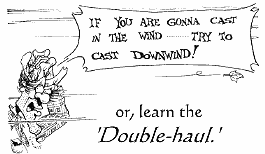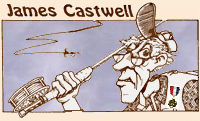|
Not often do I have the chance to, so to speak, write a column at the direct request of
someone. This one is just that. I happens one of my friends is a guide who takes folks
out onto the saltwater in a boat and they fly-cast for salmon. Here is the problem. A lot
of time and money are invested in each venture. Phone calls, planning, getting everything
ready, checking the weather the day before, making sure all equipment is appropriate and
in ready condition, and such things as flies, licenses, lunches and are taken care of. Like I
said, there is a lot that goes into a fishing trip, these are just some of the things.
The party is met, boat launched, trailer parked, motor engaged, bow pointed seaward
and the day is underway. Only to fine out quite quickly they do not understand anything
about the double-haul. The engaging method of allowing the left hand to help the right get
a cast out to something past the fifty foot mark and/or, into a wind. True you can catch
plenty of fish at fifty feet, but you can catch more if you can cast farther if needed. Consider
too, this. The better you can cast the easier it is for your guide to get you into fish. Also, it
may be safer for him if you have a good degree of control of your fly. You catch more fish,
you have a better time, you leave a bigger tip, and you have a happier guide.
Let's try to set the stage here. The guide and the two clients are in the boat and have been
casting floating or intermediate lines for a while and the guide realizes his clients cannot get
the line to form a good tight loop due to lack of line speed and often cannot reach some
surfacing fish. What is he to do? He could have asked before they left to see them cast
while still on land but that would not have been a welcomed offer, no one wants to do that,
they want to get to fishing. Can he teach the double haul while they are all in the boat? How
long would it take? They are here to catch fish, not learn to cast.
With some diplomacy it can be done, and without losing much fishing time. Here is how
it could happen:
 As a former guide myself, I would suggest you try this yourself ahead of time to prove to
yourself how well it can work. First let the boat drift with the wind, have the client cast on
the down-wind side, and take the fly OFF! The cast will be flat, that is, horizontal, parallel
with the surface of the water. It will consist of four elements. Pull. Cast. Feed. Stop. And that
is only half of the cast. It gets repeated in the opposite direction. The results will depend on the
skill of the instructor and the desires of the students. Here is how to lay it out.
As a former guide myself, I would suggest you try this yourself ahead of time to prove to
yourself how well it can work. First let the boat drift with the wind, have the client cast on
the down-wind side, and take the fly OFF! The cast will be flat, that is, horizontal, parallel
with the surface of the water. It will consist of four elements. Pull. Cast. Feed. Stop. And that
is only half of the cast. It gets repeated in the opposite direction. The results will depend on the
skill of the instructor and the desires of the students. Here is how to lay it out.
You demonstrate it first to show it works. Make ONE flat cast to the left, about twenty-five
feet of line. STOP. With the rod low and angling to the left, your left hand on the fly-line, do
this. PULL with your left hand on the line, then CAST with your right, FEED the line into the
cast to the right with your left hand, and STOP.
You MUST stop to let the brain absorb what has just happened. Now, with the line pointing
off to the right, laying on the water, PULL with your left hand on the line, CAST the rod to your
left, FEED the line into the cast (with the left hand again), and STOP. Let the line lay on the water.
Make sure the client understands that each of these is ONE element.
Next, repeating the above elements, slowly combine the two into a flat, horizontal cast with
the double-haul. As you continue pick up the line speed and the loop shape. Finally, raise the
flat cast to a vertical one using the double-haul, and let it rip out some line to show the value
of one done well. On land it is sometimes best to use only the tip of the rod so the line-load
can be felt better, but on water the wet line loads quite enough. Just three words: PULL,
CAST, FEED!
Ok, now it's the clients turn. Good luck. Make sure when they learn it they do STOP at the
end of each of the first elements, that is the secret if there is any. If you practice doing this
and teaching this it will improve your skills and the whole venture for you and your clients.
(Tips should increase too.) ~ JC
|





